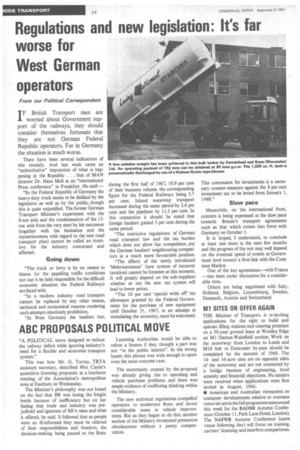Regulations and new worse for West German operators
Page 26

If you've noticed an error in this article please click here to report it so we can fix it.
From our Political Correspondent
IF British Transport men are worried about Government support of the railways, they should consider themselves fortunate that they are not German Federal Republic operators. For in Germany the situation is much worse.
There have been several indications of this recently. And last week came an "authoritative" impression of what is happening in the Republic . . . that of MAN director Dr. Hans Moll at an "international Press conference" in Frankfurt. He said:—
"In the Federal Republic of Germany the heavy-duty truck seems to be disliked by the legislative as well as by the public, though this is quite unjustified. The former German Transport Minister's experiment with the 8-ton axle and the condemnation of the 13ton axle from the very start by his successor (together with the hesitation and the mysteriousness with regard to the new road transport plan) cannot be called an incentive for the industry concerned and affected.
Going down
"The truck or lorry is by no means to blame for the appalling traffic conditions nor can it be held responsible for the difficult economic situation the Federal Railways are faced with.
"In a modern industry road transport cannot be replaced by any other means, technical and economical reasons rendering such attempts absolutely prohibitive.
"In West Germany the hauliers lost, during the first half of 1967, 10.9 per cent of their business volume, the corresponding figure for the Federal Railways being 5.7 per cent. Inland waterway transport increased during the same period by 2.6 per cent and the pipelines by 11.3 per cent. In this connection it should be noted that foreign hauliers gained 5 per cent during the same period.
"The restrictive regulations of German road transport law and the tax burden which does not allow fair competition, put the German hauliers' neighbouring competitors in a much more favourable position.
"The effects of the newly introduced `Mehrwertsteuer' (new system of turnover taxation) cannot be foreseen at this moment. Itwill greatly depend on the sub-suppliers whether or not the new tax system will lead to lower prices.
"The 10 per cent 'special write off' tax allowance granted by the Federal Government for the purchase of new equipment until October 31, 1967, in an attempt at stimulating the economy, must be welcomed. This concession for investments is a necessary counter-measure against the 8 per cent investment tax to be levied from January 1, 1968."
Slow pace
Meanwhile, on the international front, concern is being expressed at the slow pace towards Britain's transport agreements such as that which comes into force with Germany on October 1.
It is hoped, I understand, to conclude at least one more in the next few months and the progress of the rest may well depend on the eventual speed of events at Government level toward a firm link with the Common Market.
One of the key agreements—with France —has been under discussion for a considerable time.
Others are being negotiated with Italy, Holland, Belgium, Luxembourg, Sweden, Denmark, Austria and Switzerland.
101 SITES ON OFFER AGAIN
THE Minister of Transport, is re-inviting applications for the right to build and operate filling stations and catering premises on a 50-year ground lease at Woolley Edge on M1 Darton-Wakefield section. Work on the motorway from London to Leeds and M18 link to Doncaster by-pass should be completed by the autumn of 1968. The 14and 16-acre sites are on opposite sides of the motorway and are not connected by a bridge because of engineering, local amenity and financial objections. No tenders were received when applications were first invited in August, 1966.
• American and Australian viewpoints on container developments relative to overseas removals are in the full programme announced this week for the BAOSR Autumn Conference (October 11, Park Lane Hotel, London). The NAFWR Autumn Conference (same venue following day) will focus on training, carriers' licensing and interfirm comparisons.




















































































































